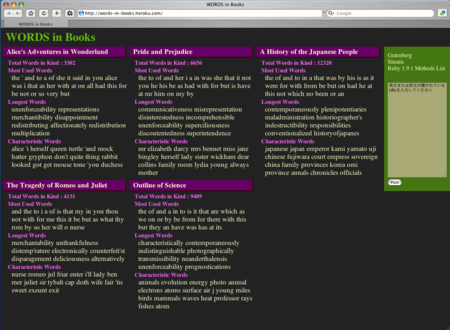Rubyチュートリアル ~英文小説の最頻出ワードを見つけよう!(最終回)
さてこれらの演算子を使って何かしたいですね…
いいのを思いつきました。
ある小説を元にしたオブジェクトから、基本単語からなるオブジェクトを差し引けば、その小説にユニークな単語が抽出できるかもしれません。
Version27
class WordDictionary
def select(regexp)
text = @freq_dic.select { |word, freq| word =~ regexp }.select { |word, freq| block_given? ? yield(freq) : freq }.map { |word, freq| "#{word} " * freq }.join(" ")
WordDictionary.new(text, true)
end
def uniq_words(n, *base)
base.inject(self) { |_self, b| _self - b.select(/./) { |freq| freq >= 10 } }.top_by_frequency(n)
end
enduniq_wordsは個数nと複数の基本単語オブジェクトbaseを取って、そのオブジェクトに固有のワードトップnを出力します。injectメソッドのブロックの中で先ほど定義した-メソッドを使っています。
ここでselectメソッドを使ってbaseオブジェクトにおける、対象単語をその頻度が10以上のものに限定することで、baseオブジェクトにおけるゴミ(基本単語でないもの)をある程度排除するようにしています。そのためselectメソッドをブロックを取れるように修正しました。
さて、早速「不思議の国のアリス」のユニークなワードを出力してみましょう。
if $0 == __FILE__
base = WordDictionary.new('public/base.txt')
alice = WordDictionary.new('public/alice.txt')
p alice.uniq_words(40, base)
end
># Argument has assumed as a text string
Argument has assumed as a text string
[["alice", 403], ["turtle", 59], ["mock", 56], ["hatter", 56], ["gryphon", 55], ["rabbit", 51], ["got", 45], ["mouse", 44], ["duchess", 42], ["tone", 40], ["dormouse", 40], ["cat", 37], ["hare", 31], ["caterpillar", 28], ["jury", 22], ["sort", 20], ["tea", 19], ["soup", 18], ["bill", 17], ["hastily", 16], ["bit", 16], ["doesn", 16], ["didn", 14], ["dinah", 14], ["anxiously", 14], ["baby", 14], ["footman", 14], ["trying", 14], ["cook", 13], ["wouldn", 13]]なんかいい感じじゃないですか!
なお最後のif $0 == FILE はこのスクリプトを他のスクリプトからrequireしたときにはこの部分が、require先で実行されないようにするための技法です。$0はrubyインタプリタに渡したスクリプト名__FILE__はこのスクリプト名を参照します。
Version28
でも、さっきからうっとうしい文字が一緒に出力されていますね。オブジェクトを内部で再構築するとき文字列を渡すのでそれが原因です。フラグを立ててこれに対処します。
WordDictionaryクラス内部でオブジェクトを生成するときはinner_callにtrueを渡して、”Argument has…“のメッセージがでないようにします。
ついでに最後の仕上げとして、クラスは入力データの名前nameを受け取れるようにし、また総単語種数を出力するsizeメソッドも定義しましょう。
class WordDictionary
att_reader :words, :name
def initialize(input, name="none", inner_call=false)
input = input_to_string(input, inner_call)
@name = name
end
def select(regexp)
text = @freq_dic.select { |word, freq| word =~ regexp }.select { |word, freq| block_given? ? yield(freq) : freq }.map { |word, freq| "#{word} " * freq }.join(" ")
WordDictionary.new(text, @name, true)
end
def size
@freq_dic.length
end
private
def input_to_string(input, inner_call)
case input
when String
begin
File.open(input, "r") { |f| return f.read }
rescue
puts "Argument has assumed as a text string" unless inner_call
input
end
end
end
def arithmetics(op, other)
result = (@words.send op, other.words).join(" ")
WordDictionary.new(result, '', true)
end
endさあこれで完成です!完成したスクリプト全体を眺めてみましょう。
require "open-uri"
module Enumerable
def take_by(nth)
sort_by { |elem| yield elem }.slice(0...nth)
end
end
class WordDictionary
include Enumerable
attr_reader :name, :words
def initialize(input, name= 'none', inner_call=false)
input = input_to_string(input, inner_call)
@words = input.downcase.scan(/[a-z']+/)
@freq_dic = @words.inject(Hash.new(0)) { |dic, word| dic[word] += 1 ; dic }
@name = name
end
def each
@freq_dic.each { |elem| yield elem }
end
def top_by_frequency(nth, &blk)
take_by_value(nth, lambda { |v| -v }, &blk)
end
def bottom_by_frequency(nth, &blk)
take_by_value(nth, lambda { |v| v }, &blk)
end
def top_by_length(nth, &blk)
list = take_by_key(nth, lambda { |word| -word.length }, &blk)
list.map { |word, freq| [word, freq, word.length] }
end
def select(regexp)
text = @freq_dic.select { |word, freq| word =~ regexp }.select { |word, freq| block_given? ? yield(freq) : freq }.map { |word, freq| "#{word} " * freq }.join(" ")
WordDictionary.new(text, @name, true)
end
def to_s
@freq_dic.to_s
end
def size
@freq_dic.length
end
def +(other)
arithmetics(:+, other)
end
def -(other)
arithmetics(:-, other)
end
def &(other)
arithmetics(:&, other)
end
def |(other)
arithmetics(:|, other)
end
def uniq_words(nth, *base)
base.inject(self) { |_self, b| _self - b.select(/./) { |freq| freq >= 10 } }.top_by_frequency(nth)
end
protected :words
private
def input_to_string(input, inner_call)
case input
when /^http/
begin
open(input) { |f| return f.read }
rescue Exception => e
puts e
exit
end
when String
begin
File.open(input, "r") { |f| return f.read }
rescue
STDERR.puts "Argument has assumed as a text string" unless inner_call
input
end
when ARGF.class
input.read
else
raise "Wrong argument. ARGF, file or string are acceptable."
end
end
def take_by_value(nth, sort_opt, &blk)
val = lambda { |key, val| val }
take_by_key_or_val(nth, sort_opt, val, &blk)
end
def take_by_key(nth, sort_opt, &blk)
key = lambda { |key, val| key }
take_by_key_or_val(nth, sort_opt, key, &blk)
end
def take_by_key_or_val(nth, sort_opt, by)
@freq_dic.select { |key, val| block_given? ? yield(val) : val }.take_by(nth) { |key, val| sort_opt[by[key, val]] }
end
def arithmetics(op, other)
result = (@words.send op, other.words).join(" ")
WordDictionary.new(result, '', true)
end
end
def pretty_print(data)
max_stars = 60
max_value = data.max_by { |word, freq| freq }.slice(1)
data.each do |word, freq|
stars = "*" * (max_stars * (freq/max_value.to_f)).ceil
printf "%5d:%-5s %s\n", freq, word, stars
end
end
if $0 == __FILE__
base = WordDictionary.new('public/base.txt')
alice = WordDictionary.new('public/alice.txt', "Alice's Adventures in Wonderland")
jp_history = WordDictionary.new('public/japanese_history.txt')
p alice.uniq_words(40, base)
p jp_history.uniq_words(40, base)
end英文小説の最頻出ワードを見つける旅はこれで終わりです。長い道のりでした。でもわたしは楽しめました。そして大変勉強になりました。
そう、このチュートリアルは皆様のためにではなく、実は私自身のために書かれたものなのです。Rubyのエキスパートが余裕を持って書いたものではなく、プログラム新人が学び試行錯誤しながら。その知力の限界を引き出して書いたものなのです。1
でも一方で、このチュートリアルを役に立ったと言ってくれる人がいつか現れると信じてもいるのです。それがRubyを学びその成果をブログで公開するわたしのエンジンになっているのです。2
最後にこのWordDictionaryクラスを使ったWebアプリケーションを構築してみました。これが今回のチュートリアルの一応の成果です。よろしければアクセスしてみてください。

機能は次の3つだけです。
- いくつかの英文小説の特徴、つまりタイトル、総単語種数(Total Words in Kind)、最頻出ワードtop30(Most Used Words)、最ワード長top10(Longest Words)、特徴ワード20(Characteristic Words)を表示します。
- 小説タイトルをクリックするとその文章の頁に遷移します。
- 右端の入力欄に英文または英文の置かれたURLを入れることで、その文章の特徴を抽出して表示します。
サイトの構築には、SinatraというWebフレームワークと、herokuというサービスを使いました。
すべてのスクリプトは以下に公開しています。 gist: 93900 - GitHub
blog comments powered by Disqus
